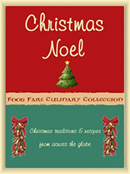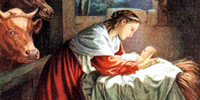|
Contents:
More:
Get the e-book edition of "Christmas Noel" >
|
History & Origins of Christmas
The word "Christmas" comes from the phrase Christes maesse, which translates to "Christ's Mass." Christmas is the celebration of the birth of Jesus for Christians around the world. It is generally agreed by historians that the first Christmas celebration occurred in Rome in 336 AD.
Christmas is a time of rejoicing and celebration. Being with family is perhaps one of the most important elements of the holiday. Much of the story of Christmas is related in the Bible, in the gospels of Saint Matthew and Saint Luke. The story seems as old as time, but it defines the holiday in its true meaning.
Seeking shelter from a storm, Mary and Joseph came to the town of Bethlehem. There were no rooms left at the inn, so the innkeeper allowed them to stay in his stable with the animals. After the birth of Christ, a star is said to have appeared over the stable, which led people to the baby Jesus. Twelve days after the birth, the Three Kings arrived bearing gifts for the child. The exact date of Christ's birth in not known, but an early Roman calendar places the date as December 25th.
By the 12th century, Christmas was a solemn religious celebration. Prayer was emphasized, but soon the idea of decorations, feasting and gift-giving became popular. In 16th century England - during the Reformation - a few church leaders thought Christmas was a Pagan holiday which corrupted the true meaning of the event with holly, gifts, mistletoe and special meals. For many generations Christmas changed, but then non-religious aspects of the holiday made their way back into English traditions.
Christmas was not much of an event in America until the 1860s. In 1867, Macy's department store in New York stayed open until midnight on Christmas Eve. In 1874, the same department store displayed a front window with a Christmas theme.
Nowadays, of course, the weeks leading up to Christmas are the biggest shopping days of the year in America. In the United States, 85% of the population is Christian. Because Christians follow Jesus, his birth is a special celebration.
Christmas is a season of hope and renewal, of personal religious belief, family togetherness and a general sense of peace, and hope for the same peace in the world around us in the year to come.
• Next: Legends of Santa Claus >
|
![]() Christmas Noel ©Food Fare
Christmas Noel ©Food Fare
![]() Webmaster:
Webs Divine
Webmaster:
Webs Divine
![]()



